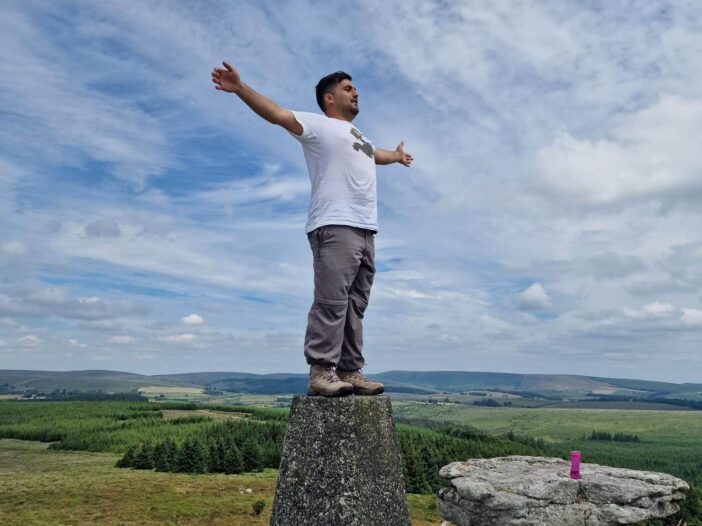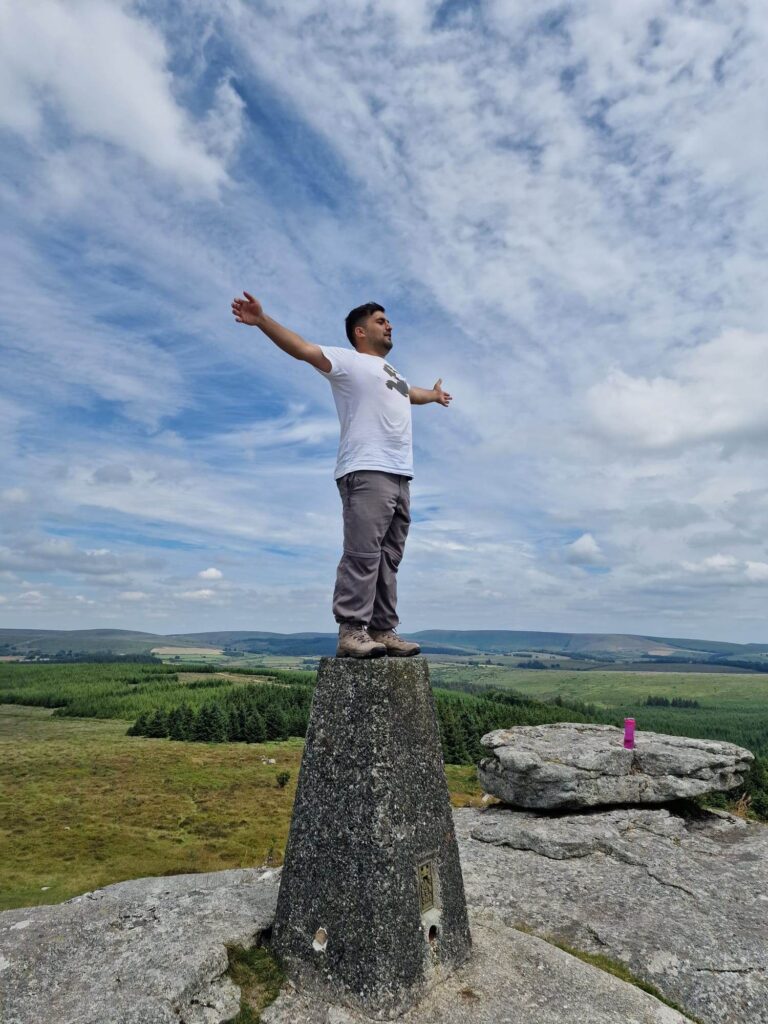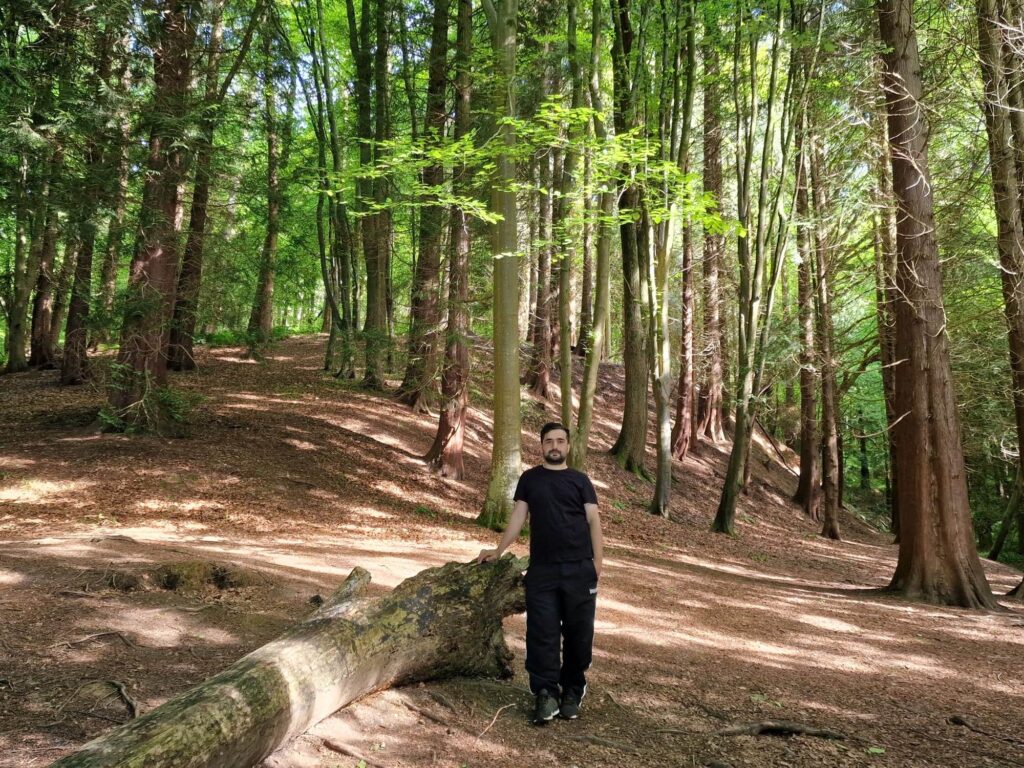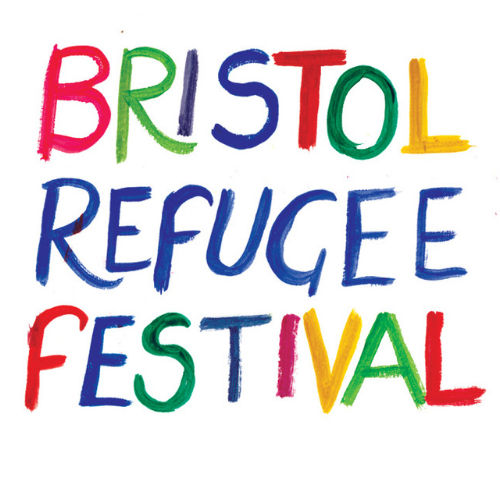
Since arriving in the UK seven years ago, Nabil Amini’s been a powerhouse in his community. Along with BRF, he currently volunteers with Bristol Refugee Rights, Borderlands and Aid Box Community – running art tables, working to make people feel welcome and to bring a smile to as many faces as possible. He’s also a member of the Bristol Refugee Artists Collective (BRAC), who are looking ahead to a joint exhibition with UWE later this year.
It’s safe to say Nabil takes every opportunity he can to get out, meet people and exercise his creativity. Here he talks more about his motivations and his philosophy for wellbeing.

Before, it wasn’t my interest in doing art. I wanted to go to university to study biology, but I wasn’t allowed to in Iran because I’m a refugee. The first time I arrived to Bristol Refugee Rights (BRR) they had an art table and said did I want to paint something. . So I did some painting and they said ‘Oh, you’re really good at that’. I said, ‘Seriously?! You mean that is good?!’ They said yes! Then every time I went to BRR I did a painting, and I brought some stuff home to practice a lot. Maybe 5 years ago, I got my first exhibition, as part of BRAC.
Sometimes people suggest doing meditation and say ‘close your eyes and relax’. , but when I close them my brain is not mine, it’s going everywhere. Painting is like my meditation.
I really like realistic painting. I like landscapes most, showing the beauty of nature. I’m using landscapes to help people connect with nature. Colour is very important to me. Colour is everything! In my opinion, green makes you calm. Other colours might make you feel upset. When you go outside and see the damage, you feel it in your heart.Because I lived in three different countries, I know how the climate changes and how bad it is for the people in those areas. I’ve seen the problems in Afghanistan and Iran. Most of the people in Afghanistan are farmers – when blossom is damaged, they don’t have any fruit in the summertime. Lots of rivers are dry, because there’s no snow, or snow at the wrong time.
I used to live in a small village in Iran with a beautiful river. It had wild animals, horses and fish. We were going swimming, hunting fish and cooking them. That was the best time in my life. Then, the next city opened lots of factories. They put all the sewage in the river, and all the trees died. I saw the way it had changed, it was so sad.
When I go outside and walk sometimes I believe each bush or plant looks like a hand. I touch my hand to the leaves of trees to say hello. I feel like they’re my friends in a way and if I miss some of them, in my heart I say ‘I’m sorry, I’ll catch you next time!’
I love music and dancing. I have four instruments at home – a santor from Iran, guitar, keyboard and flute. I can’t play any of them – yet I’m still happy I have them! I’m learning to play guitar with the Dovetail Orchestra. I’m also doing a show this month with ACTA, the community theatre. I like it because it’s about climate change, and also family. Nowadays I think society is making families far away from each other. The culture here is very different from mine. Here you leave home at 18. In my country we stay together: sometimes the parents make a bigger house, and even if I got married I would stay or live nearby.
For me, doing art and music is a way of being with people, which makes me calm. When I’m doing some activity with someone I’m not thinking about bad things. I don’t judge others and if they judge me on anything, I can ignore it. It makes me patient.
I really like helping people. Volunteering at BRR, when I’m talking with people they hear similar languages to their own and that makes them happy and comfortable. When I serve them I think, I don’t have the money to help in that way but I can help them with talking or thinking positively.
The refugee people, before they get the visa, they’re not really happy and they’re not thinking about anything except their cases with the government. So I talk to people and say, I know it’s hard, but it can be OK. You’re not allowed to work, you don’t have any money, but you can’t change that. If you’re always thinking bad things, it might do bad things to you. Wellbeing is very important. If you become sad, lots of problems come into your mind, and lots of health issues in your body. When people come into these charities we want them to enjoy their time – because when the time is gone, we can’t get it back. So don’t just spend the time thinking about your case. You can learn lots of things while you’re waiting. Especially in Bristol there are lots of good activities and opportunities for people. I know it’s impossible to make all the world peaceful, but at least I can improve some people to think positive things.
Before I worked with those charities, I was like a bird without wings. They give me the wings to fly to help the people. I need to help people and for me nowadays it doesn’t matter who needs help – be it British, immigrant, refugee. All of us are human and we have our dark side and light side. All of us are the same. The blood that is in my heart is the same colour as any another person, whether black or white or from any other country. It doesn’t matter – we are all the same.
Nabil featured in the We The Curious ‘Earth Stories’ series – read it here.Borderlands has produced a toolkit for those interested in running art tables for refugees and asylum seekers. Access it here.

